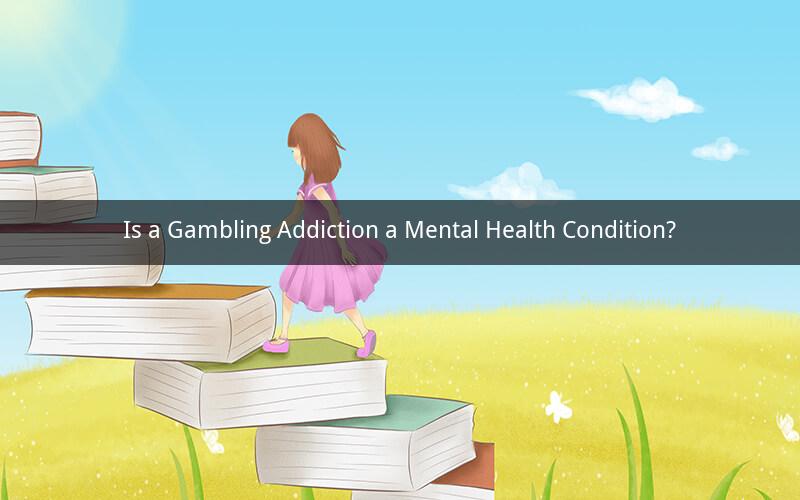
Gambling addiction, also known as problem gambling or pathological gambling, has been a topic of much debate and research in recent years. While some argue that it is a form of addiction, others believe it to be a mental health condition. This article delves into the debate surrounding this issue and explores the various perspectives on whether gambling addiction is indeed a mental health condition.
Introduction
Gambling addiction is a serious issue that affects millions of individuals worldwide. It is characterized by an uncontrollable urge to gamble, despite negative consequences. The debate on whether gambling addiction is a mental health condition or a form of addiction has been ongoing for years. In this article, we will discuss the arguments for and against this debate, and explore the evidence that supports both sides.
Arguments for Gambling Addiction as a Mental Health Condition
1. Diagnosis in the DSM-5
The American Psychiatric Association (APA) recognizes gambling addiction as a mental health condition in the Diagnostic and Statistical Manual of Mental Disorders, Fifth Edition (DSM-5). The DSM-5 defines gambling addiction as a behavioral addiction, similar to substance abuse disorders. This classification supports the argument that gambling addiction is a mental health condition.
2. Similarities with Other Mental Health Conditions
Gambling addiction shares many similarities with other mental health conditions, such as substance abuse disorders, mood disorders, and anxiety disorders. These similarities include symptoms like impulsivity, mood swings, and a desire to escape reality. By classifying gambling addiction as a mental health condition, it becomes more accessible to treatment and support.
3. Genetic and Biological Factors
Research has shown that gambling addiction may have a genetic and biological basis. Studies have found that individuals with a family history of gambling addiction are more likely to develop the condition themselves. Additionally, brain imaging studies have shown that gambling addiction can alter the brain's reward and motivation systems, similar to other mental health conditions.
Arguments Against Gambling Addiction as a Mental Health Condition
1. Focus on the Behavior
Some experts argue that gambling addiction should be viewed as a behavior addiction rather than a mental health condition. They believe that the focus should be on the gambling behavior itself, rather than the underlying psychological factors. This perspective emphasizes the importance of intervention strategies that target the behavior rather than the individual.
2. Lack of Empathy and Support
By classifying gambling addiction as a mental health condition, some individuals may feel that they are being stigmatized and viewed as mentally ill. This can lead to a lack of empathy and support from friends, family, and society. Those who argue against the classification believe that focusing on the behavior can help reduce stigma and encourage individuals to seek help.
3. Treatment Approaches
Another argument against classifying gambling addiction as a mental health condition is the potential for inappropriate treatment approaches. Mental health conditions often require specialized treatment, such as therapy and medication. However, gambling addiction may be better addressed through behavior modification techniques and support groups, which are not typically associated with mental health conditions.
Evidence Supporting Both Sides
While the debate continues, evidence supports both sides of the argument. Some studies indicate that gambling addiction has a mental health component, while others suggest that it is primarily a behavioral issue. This evidence highlights the complexity of the issue and the need for further research.
1. Research on Mental Health Components
Several studies have found a link between gambling addiction and mental health conditions, such as depression and anxiety. These studies suggest that gambling addiction may have a mental health component, contributing to the argument that it is a mental health condition.
2. Research on Behavioral Components
On the other hand, research focusing on the behavioral aspects of gambling addiction has shown that the condition is influenced by factors such as impulsivity, reward-seeking, and risk-taking. This evidence supports the argument that gambling addiction is primarily a behavioral issue.
Conclusion
The debate on whether gambling addiction is a mental health condition or a form of addiction continues to be a topic of much discussion and research. While some experts argue that gambling addiction is a mental health condition due to its similarities with other mental health disorders and its genetic and biological basis, others believe it should be viewed as a behavioral addiction. The evidence supporting both sides of the argument highlights the complexity of the issue and the need for further research. Regardless of the classification, it is crucial to address the challenges faced by individuals with gambling addiction and provide them with the necessary support and treatment.
Questions and Answers
1. Q: Why is there a debate about whether gambling addiction is a mental health condition or a form of addiction?
A: The debate arises due to the varying perspectives on the underlying causes and treatment approaches for gambling addiction. Some experts believe it is a mental health condition, while others argue that it is primarily a behavioral issue.
2. Q: Can gambling addiction be treated as a mental health condition?
A: Yes, gambling addiction can be treated as a mental health condition. Treatment may include therapy, medication, and support groups, similar to other mental health disorders.
3. Q: How does gambling addiction differ from other forms of addiction, such as substance abuse?
A: While gambling addiction shares some similarities with substance abuse, the primary difference lies in the nature of the addiction. Substance abuse involves the consumption of a substance, while gambling addiction involves engaging in gambling behavior.
4. Q: Can genetics play a role in developing gambling addiction?
A: Yes, research has shown that genetics may play a role in the development of gambling addiction. Individuals with a family history of gambling addiction may be more susceptible to developing the condition themselves.
5. Q: What are some effective treatments for gambling addiction?
A: Effective treatments for gambling addiction include cognitive-behavioral therapy, self-help groups, and support from family and friends. Additionally, some individuals may benefit from medication and other forms of therapy.